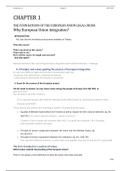Resume
Europees recht - CHAPTER 1 (uitgebreid) - samenvatting
- Cours
- Publiekrecht 2
- Établissement
- Katholieke Universiteit Leuven (KU Leuven)
KUL - Publiekrecht II - Europees recht - E. Muir Volledige te kennen leerstof voor Europees Recht. Dit document is aangevuld adhv mijn notities en met documenten uit voorgaande jaren. Ikzelf behaalde adhv deze documenten een 9/10 voor Europees recht. (Mijn excuses voor eventuele spellingsfoute...
[Montrer plus]



